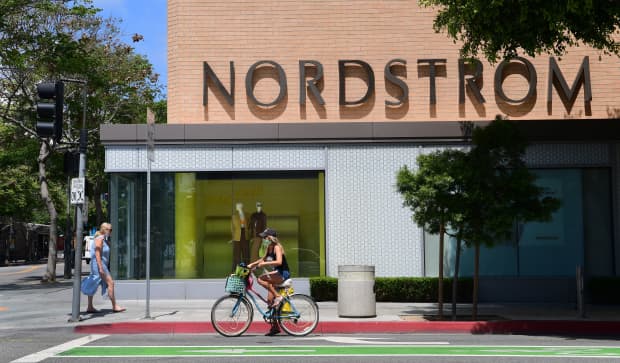This post was originally published on this site

Nordstrom shares have soared after positive coronavirus vaccine news from Pfizer and Moderna.
AFP via Getty Images
Positive vaccine news two weeks in a row has sent department store stocks soaring.
Nordstrom Inc. JWN, +11.81% shares have skyrocketed 57% for the month to date. Macy’s Inc. M, +5.23%, which is scheduled to announce third-quarter earnings on Thursday, is up nearly 25% for the period. And Kohl’s Corp. KSS, +6.24% is up 19.6% for November so far.
Shares of J.C. Penney Co. Inc. JCPNQ, +18.37%, which just had the sale of its retail and operating assets to Brookfield Asset Management Inc. and Simon Property Group approved by the U.S. Bankruptcy Court for the Southern District of Texas, soared more than 30% in Monday trading and has gained more than 79% for the month to date.
Specialty retail is also getting a bump after the vaccine news with Gap Inc. GPS, +6.59% (up 20.2% for November so far), Abercrombie & Fitch Inc. ANF, +2.43% (up nearly 31%) and Urban Outfitters Inc. URBN, +2.15% (up 22.1% for the period) all rallying.
Stocks across retail, entertainment, cinemas and theme parks, and travel all jumped after news that companies including Pfizer Inc PFE, -3.71%. and Moderna Inc. MRNA, +10.23% have made progress on a coronavirus vaccine.
“Vaccine development and efficacy are crucial for those retailers that have suffered under the pandemic’s effect on social occasions,” said Ron Rangel, retail analyst at Pacific Asset Management.
“They may not see a material positive impact until the vaccine is widely administered and there is a return to normalcy, but this is a clear step in the right direction and creates opportunity.”
Department stores and many apparel retailers, already hurting due to changes in consumer behavior before the pandemic, have seen the hurdles grow during COVID-19. In particular, e-commerce adoption has accelerated with many consumers now doing most of their shopping online.
The pandemic forced nonessential stores to close for a period and has placed restrictions on store capacity. Many brands and retailers have ramped up omnichannel options, like curbside pickup, to drive business. But with many working from home and large gatherings canceled, there aren’t many reasons for shoppers to buy items like a new dress or tie.
Also: Farfetch says luxury shopping has permanently moved online, shares jump
And: Revolve shares sink as lack of parties and events weighs on sales
Moreover, recent data shows that many consumers are still concerned about going to malls and stores, especially now that the coronavirus is surging to levels that some experts say could be a “humanitarian catastrophe.”
Data provided by Bluedot, a location technology company for mobile apps, found that one of the top three reasons why consumers are downloading retail apps is they want to limit contact with other shoppers.
And 92% of consumers have some level of concern about whether stores are taking the appropriate health and safety precautions during the pandemic.
The pandemic has also driven financial concerns among consumers. Deloitte LLP data shows that even as safety perceptions slowly improve, financial stress persists.
See: E-commerce gains importance for grocery consumers most financially impacted by COVID-19
“As we saw earlier this year, health concerns and spending are closely intertwined,” said Stephen Rogers, executive director of the Deloitte Insights Consumer Industry Center.
“Consumers are beginning to feel more comfortable with resuming some activities of pre-pandemic life despite a third wave rising in the U.S. With the expiration of stimulus funding and continued unemployment levels, financial concerns are on the rise.”
Deloitte data found that 29% of U.S. respondents are struggling to make upcoming payments, 29% are planning to cut back on clothing purchases and 29% plan to trim their restaurant spending.
Restaurant brands including Outback Steakhouse parent Bloomin’ Brands Inc. BLMN, +5.86% and Olive Garden parent Darden Restaurants Inc DRI, +0.48%. have also seen their stocks rise after the vaccine news, with shares up 24% and 20.3% for the month to date respectively.
Even with the vaccine progress, Pacific Asset Management’s Rangel says investors should be cautious.
Don’t miss: Papa John’s CEO says the company has added more than 8 million new customers this year
“Despite a fair amount of optimism, investors must consider the issuance of debt/equity that has bridged liquidity over the past seven-to-eight months and the capital structure damage it has caused for certain companies,” Rangel said.
“For some retailers, it will take time for balance sheets to heal and earnings-per-share to return to pre-pandemic levels. Others may not be so lucky.”
The ProShares Decline of the Retail Store ETF EMTY, -2.55% has fallen 26.1% for the year to date. The SPDR S&P Retail ETF XRT, +1.92% is up 21.6%. And the benchmark S&P 500 index SPX, +0.66% has gained 12% for 2020 so far.


